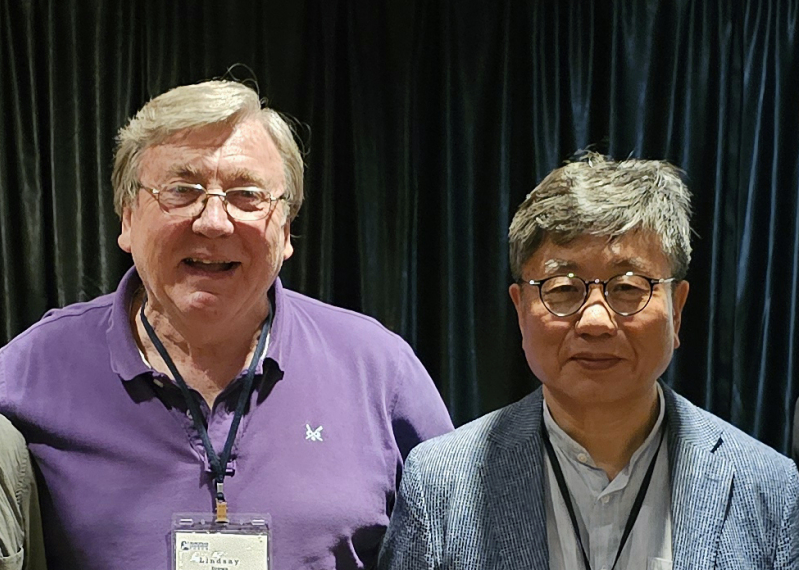
When a delegation of Korean mission leaders spoke at the recent European Leadership Forum in Wisla, Poland about their desire to seek collaboration between Korean missionaries and European churches, it was just the most recent development in a new movement toward unity and partnership between the Global South and the Global North that began to emerge last year.
During the forum, Christian Daily International’s Executive Editor sat down with Lindsay Brown, former General Secretary of the International Fellowship of Evangelical Students (IFES) and former International Director of the Lausanne Movement, who facilitated the session with the Korean leaders. Brown was invited to comment on what is taking place from a Western perspective, and what it means for mission leaders and churches in Europe and North America.
“First of all, it is a reflection of the fact that the balance has shifted globally in terms of the global missionary network,” Brown began, and explained that “in 1910, at the time of the Edinburgh mission convention, which was a major event, only 5-8% of the participants were non-Western and over 90% were Western. In 2010, one hundred years later at the Lausanne Movement’s Third Global Congress in Cape Town, it was 65% non-Western and 35% Western. And that [ratio of non-Western] has increased again [since then].”
He said that the Korean missionary force today is the second largest in the world – second only after the Americans – with an estimated 30,000 cross-cultural missionaries. These numbers only reflect the officially dispatched missionaries, however.
“That differentiation is going to grow even further because it doesn’t include the many unofficial non-traditional missionaries like the Filipinos that are coming to look for work in the Gulf states and are bringing the gospel with them,” he noted.
“The percentage would be much higher, I think, if you include the non-traditional missionary force,” he added, commenting that this is what early missionary force in the first century in the New Testament looked like as “they were all working at the same time.”
“So, it’s a reflection of the fact that there is a huge change.”
“Secondly, subsequent to that change, there is a growing confidence amongst missionaries, theologians, and church leaders in the non-Western world,” Brown said. “They have a growing impact on the advance of the gospel worldwide and an increased say in it. There are increasing levels of regional and global conferences just for leaders in the non-Western world or the Majority World, which is a reflection of growing confidence also.”
“But then positively what it shows is that the leaders of one of the largest missionary forces from Korea are saying that they would like to partner with Western churches as equals. Not as subservient cross-cultural workers, but as a body of people who have an equal say and an equal commitment to the advance of the gospel globally,” he said.
“They would like to dialogue together about the key theological and missiological issues that need to be addressed, and to be involved in active partnership. They are taking initiative in putting their hands out, offering to serve together.”
“If the Western leadership doesn’t take note of that, they will be left behind. That’s basically what will happen,” Brown said, highlighting the historic nature of what is taking place right now and the unique opportunity to unite.
“Gracious leaders from Asia have come here and are saying, ‘Let’s work together’,” he said, and emphasized that this should not be considered lightly by those in the West.
“They don’t need to anymore; they are outstripping the Westerners. There is no room, therefore, for arrogance among Western church and mission leaders,” Brown said.
Celebrating the fulfillment of God’s promises
Yet, most of all, he invites his fellow Western leaders to celebrate the global changes that have become evident over the past few decades and recognize them as God’s work.
“It's a huge shift. What we’re seeing in our generation, the globalization of the gospel, the internationalization of the gospel, and the fulfillment of the Biblical prophecies in Habakkuk 2:14, the glory of the Lord will be evident as the waters cover the seas. That’s what we’re seeing,” Brown said.
“It’s amazing that Habakkuk could write that because there were hardly any non-Jewish believers [at that time]. There were some but not many. And even when you get to Isaac Watts saying, ‘from the rising of the sun to the going down of the same, the Lord’s name should be praised.’ That was before William Carey’s impact and the Western missionary force,” he noted.
“But what we see now is the fulfillment of the prophecies of the Old Testament and the New Testament and the vision of some of those hymnwriters,” he exclaimed. “This is wonderful to see. This shows that God keeps His promises.”
“And it shows that the Church is penetrating every country of the world,” he said, noting that it has yet to penetrate every people group. “Because although there are maybe 200 nation states in the world, when the New Testament talks about every nation, the Greek word was ethne, which of course refers to a linguistic group. And there are many thousands more of that.”
How the Global South began to overtake the Global North in missions
Brown then traced some of the shifts that took place in global missions over the past fifty years, and the rise of Global South missionaries participating in fulfilling the Great Commission.
“Since 1974, there has been renewed emphasis on reaching the unreached people groups. When it was enunciated at the Lausanne Congress, very few European churches picked it up. But it shifted the balance of focus among the American churches where a whole movement emerged called ‘adopt a people group’. So, many churches in the States deliberately prayed for and targeted unreached people groups within countries and challenged some of their members to go to those nations,” he said.
“But now we’re seeing many non-traditional missionaries going to those hidden groups as well in search for work and taking the gospel with them. And there are many wonderful stories how God is using them, especially in the Muslim world.”
“I think it’s symptomatic of growing confidence in Majority world leaders, especially in Asia. And I suspect that what we’re going to see in the next 20 years is the acceleration of the missionary force and increased number of international leaders coming from the Majority World, and probably fewer from the Western world. That’s how things seem to be inexorably moving,” Brown said.
He said that some people might worry that there are fewer missionaries going out from the West, but highlighted, “what we’re seeing is God opening up new streams of missionaries.”
He shared about a recent conference he attended where he met missionaries from one Middle Eastern country who are planting churches in another Middle Eastern country where they have unique opportunities to reach migrant communities.
Similarly, countries from Asia, Latin America and Africa have seen significant increases in missionaries that are sent cross-culturally, including to Europe. “One of the key reasons for the growth of evangelicals in France is the African diaspora. So, we should be excited by that and thankful for the change,” Brown noted.
He also pointed to “Francophone Africans who are starting programs to send out from Eastern Congo, one of the poorest parts of Africa, to many other French-speaking countries in Africa.” While not well known yet, “they are characterized by great faith, determination, and creativity,” he said.
“We shouldn’t be discouraged. It’s impressive,” Brown emphasized. “But we should recognize the shift and that our contribution could become subsidiary in due course. I think the Lord is fulfilling His promises, just with a reduced impact of Westerners and an increase of the contribution of other parts of the world.”
“There is always room for people who are wholehearted in their devotion to Christ, who love the gospel and have a concern for people. There will never be enough of those people to be engaged in the Great Commission, whatever culture they come from,” he added. “But we will be more effective if we esteem others better than ourselves, if we are less concerned when it comes to the lifestyle, and if we are humble and work in partnership.”
Therefore, commenting on the current conversations with the Global South mission leaders, Brown said, “They are stretching out the hand of fellowship and partnership. So, the Western mission leaders and church leaders should say, ‘yes, we want to partner!’ And they should rejoice in the invitation.”





